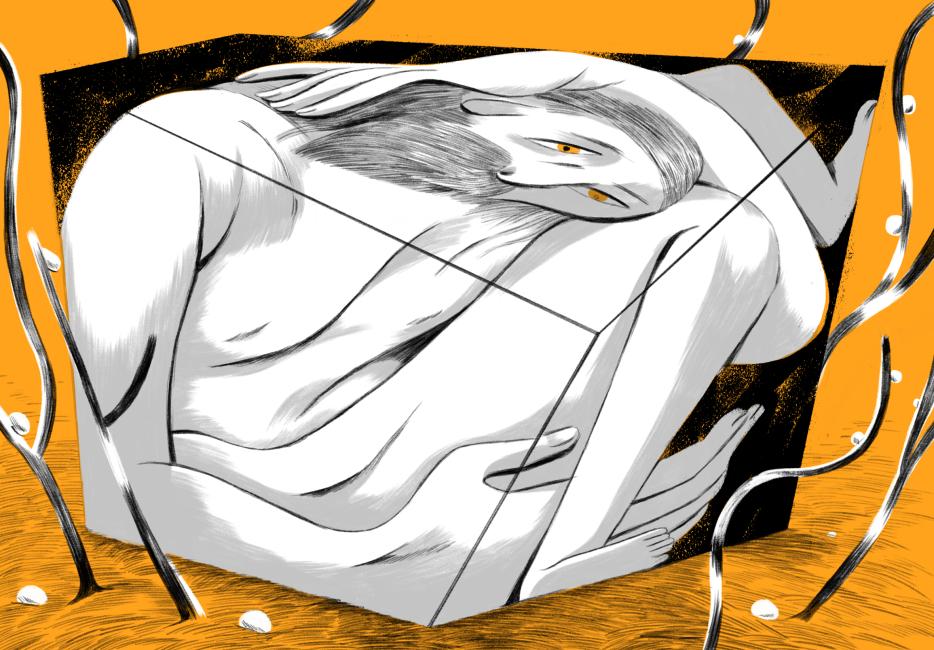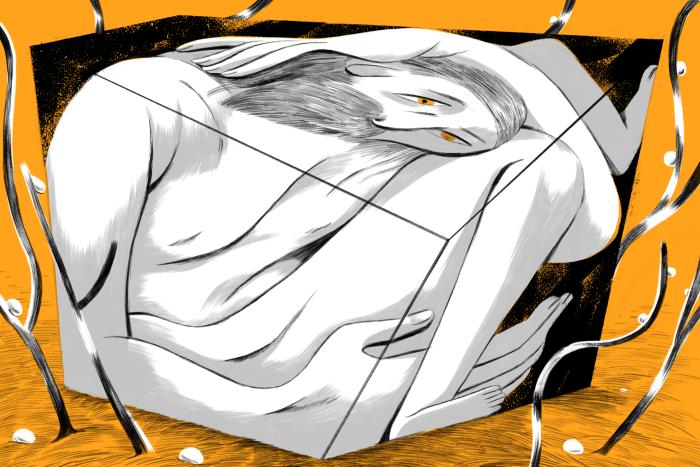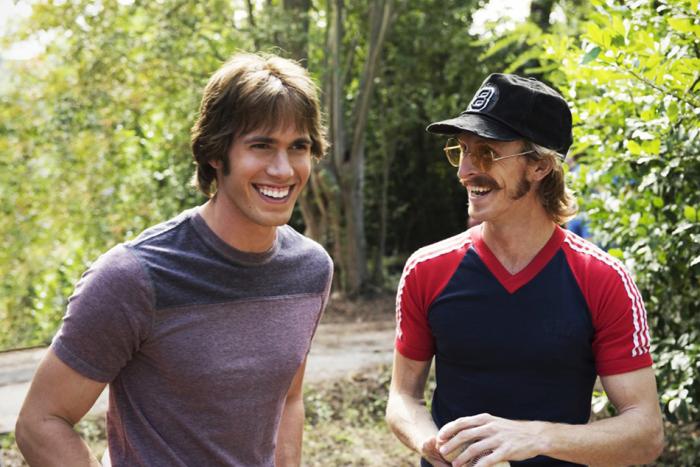I.
On a remote piece of land in a lesser part of the Commonwealth, a man found that the links of his shackles had turned to soft orange dust and consequently, he was a little bit free. He didn’t know how many years he had been held captive, but he did know that it had not been his choice to live in this manner. No, it wasn’t like that at all. As a boy he had been led to this discreet area by force and with threat, enough of each that he could no longer recall the exact series of events that left him in a dark metal container with a small square-cut hole in the roof. Chains bound his wrists to his ankles, which became more limiting as he grew. He tried not to grow.
The man’s captor was a stranger named Burt who spent his days banging on the metal container at unexpected intervals, screaming gibberish mixed with fucks and fuckings. The man knew his name was Burt because Burt always said This is Burt before beginning his daily tirade and required him to say Thank you, Burt once it was complete.
The man was still a young man, although how young, he couldn’t tell. Long ago he had stopped counting the number of times the sun filled the square above his head, and besides, he had no tool to record that number, and also he lost count because of lack of nutrition and intermittent sleep patterns, and too, he stopped caring, as one would. There were so many reasons to lose track. What does one care about when in captivity? What does one treasure? It depends on what kind of person you are—perhaps sentimental, tender of heart. This boy—this man—was neither, which isn’t to say that he was cold. No, he was just somewhat forgetful, which was helpful in adjusting to his imprisonment. Very quickly he forgot the face of his mother and the voice of his father. He forgot their names and where they sat daily at their family table, and if there had been anyone outside of the three of them. And in forgetting, there was peace. What he treasured was peace, and silence, and the precise moment—the extra beat after the final clang or fuck you fucking fucker—that told him Burt had finished with him for today. Thank you, Burt said the young man, and he meant it.
The young man treasured one other thing: the time he spent outside his cell. When he had first been caught and hadn’t yet lost all of his will or lean muscle, he discovered that by pushing the blue Beatrice milk crate he used as a pillow beneath the square hole in the roof, he could thrust the top half of his head through and see some of what surrounded. The blunt tin edges pushed his ears down, making fine, lateral abrasions where the arms of a pair of spectacles might curve were he not a captive whose eye health was of no concern to anyone. On days that were bright and on days that were not, the young man lived in this narrow view, until the sun made him too hot or the rain made him too cold. Eventually the abrasions welted and he no longer felt any soreness above his ears. If he’d been in possession of a mirror, he would have seen that his ears had curled down to allow for his favoured position in the roof. It was a touching gift for a body to give a soul.
On this day, when the man was still a young man but not very, curled around his milk crate in something approximating sleep, he felt his wrists release from the position they’d been bound in since his arrival. The cuffs remained, but his hands raised themselves unbidden as if filled with something lighter than air. In the pure darkness, he pressed his palms against the ceiling, a thing he’d never been able to do until now.
Run, it said. Run quietly, but more importantly: run now.
With Beatrice’s assistance, he butted through the hole, forcing the metal past his deformed ears so that his head was completely outside the shack. The young man’s toes pressed against the milk crate, muscles he’d never used, radiant and aching. The closeness of the stars drew tears and he wept noisily, remembering the small twin sisters who now must be near marrying age. Bringing his hands up to the edges of the hole, he thought of the girls and his parents standing in the sun, hands linked like paper dolls. Bracing himself, he pulled on the filthy tin edges with whatever might he’d been keeping for this moment.
From the outside, the little shack seemed like a good place to store hammers and a few old chairs, things that needed fixing and the tools to fix them. The young man’s stomach turned without warning and he doubled over, releasing a stream of yellow vomit, which splashed onto the roots of the maple that stood behind him. It wasn’t his home anymore. He was free, and the shining crescent moon above was the only witness to this new fact. On trembling legs, he pushed away from the bilious tree and made his way to the dirt path that led away from the shack. The night quickly filled him with strength. Fresh air and open space! He could almost laugh with the difference of it.
The path veered left, placing the young man back in front of the tin shack he’d just left. Blearily, he walked around it, wondering how he could have doubled back without noticing. He laid his hand in the deep dent on one of the wall’s edges, the spot that Burt struck with such endurance that the paint had been stripped. A hacking cough came from behind the wall; a wet cough, trying for relief. The sonic closeness made the young man’s head spin. This sound that was only a foot away from him, contained by this corrugated wall, cold to the touch, which was not his own, but like his own. The cough came again and the wall vibrated under his fingers with the force of it. The young man pressed his hand to his chest, felt his heart beating beneath it with an intensity that spoke. Run, it said. Run quietly, but more importantly: run now.

Michael returned to the clinic as soon as he could, tired and pallid. He still liked having his blood taken, but it was becoming less potent. Now, sitting in the nurse’s vinyl-and-metal chair, his mind kept staggering back to Gretchen. Gretchen’s back in front of him, Gretchen’s braids in the sun, Gretchen watching him from a bed of needles, both predator and prey. He didn’t think about anything else. Gretchen was a cap over the lens that pointed up at the sky.
The automatic doors parted for Michael with a shuddering burst, something having interfered with its mechanism. Donna, the receptionist, had generously turned her back to the snack table, allowing him to pocket three juice boxes and an entire row of Oreos. Calories were hard to come by these days, as Michael was too scared to steal. He didn’t know what punishment was like in this town, and he had no taste for thrills. He was content enough to spend his days in the cellar or walking in a directionless manner, hoping to catch sight of Gretchen and Sissy. He would offer to be their steward, which as he remembered from a book of stories his mother had once read was a noble and necessary pursuit.
“Michael,” said Donna, handing him an envelope on his seventh or eighth or ninth visit to the clinic. “I wonder: does anyone know where you are?” Donna’s voice had a tone that Michael found difficult to read, but struck him as non-threatening. She sat in her squeaky chair, leaning forward so that her breasts rested on the desk like the bags they put goldfish in at pet stores. “I know you’ve never mentioned family, but I…” she pursed her lips. Michael was nervous. No one had said that his parents needed to know his whereabouts in order to sell blood. He remembered needing permission for things as a boy, but he had, perhaps wrongfully, thought that unnecessary now that he had a beard. Donna noticed his unease. “It’s fine! You’re not in trouble. I just worry about you is all,” she said, blushing. “A man can’t live on cookies alone.” Michael’s heart swelled at her words, for they reminded him of his mother, yelling at him to eat all the moist foods she’d placed before him. Donna’s voice penetrated his reverie. “I’m about to close up for the night. Why don’t you come home and have dinner with me? I’m making my Special Spaghetti.” She smiled, showing her white teeth and shiny gums.
Her kitchen was warm and wood-panelled with blips of a green Donna called avocado. It was not pretty, but it was the first kitchen Michael had been in since the day he’d disappeared. In the adjoining room, Donna put on a record, whose notes entered and eddied around the room. “This is pretty good,” he told her, spooling spaghetti on his fork and depositing it in his mouth. Donna stared deeply into her bowl. “My husband loved this sauce,” she said, casting a doleful glance at a portrait on the wall depicting a fat but otherwise unimpressive-looking man. Michael stopped eating to examine it. “Your husband is very old,” he said finally. “Ha ha!” She yelped. “Alec was my father’s best friend and business partner. My father owned a box company, so naturally I grew up surrounded by boxes! Hiding in the boxes and making a nuisance of myself, you know.” She pulled her chair closer and poured herself some more juice from the decanter. “Alec was very handsome when I was a girl. Suit every day, hair perfect. He smelled exactly as a man should smell. Like a box.” Donna giggled and shook her head. Michael thought of his own father, who had no smell that he could recall. “He sounds like a good person,” he told her, drinking his juice, which tasted sort of rotten but warmed him from the inside out. “He was good,” Donna said, too loudly. “Good to me. Good to his employees. But he died of a stroke two years ago. We’d only been married six months.” She pushed her plate aside and rested her head on the table.
Donna’s bed was full of pillows and smelled like skin. Unlike Gretchen, Donna placed her lips all over Michael’s body, moving her tongue against it in a way that he liked. She gently moved him so he was positioned over her, which was, again, unlike how he had done it with Gretchen.
“Your season is definitely Winter,” she said, flushing. “It’s obvious now.”
Donna invited Michael to stay with her for as long as he wanted. The next morning, after she left for work, Michael bathed and cut his nails with clippers from a plastic basket on the bathroom counter. Donna had left some clean clothes for him on the bed. The clothes felt soporifically fleecy against his skin, so much so that after dressing, still hot from his bath, he lay on his back in the centre of the bed and fell asleep. Michael didn’t typically dream, or if he did, it was of bugs and dried fruit that looked like bugs. They were dreams with no flow, so he had nothing to flow with. But now, on Donna’s bed, in her husband’s washed-soft clothes, Michael dreamed himself back in his cell, with its small, stinking business pit and the rocks he had once arranged in the shape of a clock face. And there was Beatrice, his crate, so blue and so yielding in its plastic way.
When he woke, Michael went downstairs to the living room that Donna had decorated in various yellows, with amber wallpaper and collaged side tables. Magazines were heaped on the glass oval table in the centre of the room, a dusty game of Chinese checkers left mid-play. Examining the small book case listing away from one wall, Michael found he knew how to read. He’d never done very much of it, but text still formed itself in his eyes as speech did in his throat. He selected a thick women’s magazine from the glass table and wedged it deep beneath the case. It stood a little straighter.
When Donna arrived home at dusk, Michael was sitting at the kitchen table, staring into the backyard as a squirrel shook the mount of her bird feeder with its tiny paws. “They spill the seeds onto the ground and don’t even eat any of it,” she told him, turning on the Tiffany style lamp swag-hung above the table. “Michael,” she said, pulling at his shoulders. “These clothes must be twice your size. You look like a child.” Donna’s eyes filled with tears as she straightened the place mats.
With Donna’s assistance, Michael shaved his face bare, observing its lines and hollows in the light of her pink bathroom. “Which of your parents do you look like?” she asked, gathering the wet hair in her palms and throwing it in the toilet, where it floated like a wiry nest. “Your season is definitely Winter,” she said, flushing. “It’s obvious now.”
Donna cooked plenty of food, most of which required simmering and stirring. Michael chopped celery and rinsed beans and punched cold eggs into meat to form loaves. Where he had previously been gauntness and angles, he now developed soft pockets of flesh that pressed against Donna’s.
“Are you happy?” she asked him one morning, inserting her finger under the steel screw pin of his wrist shackle. “Because I’m extremely happy.” Michael couldn’t say whether he was happy or not. His body felt good and he was always warm, but it wasn’t the same as when he’d been with Gretchen in the woods. There, everything had seemed new—every taste, every touch, every sight. In truth, each time Donna left for the clinic, Michael was relieved to be free of her probing fingers and constant line of questioning. The books and magazines he read filled some appetite of his, but aroused something else. Tedium. Tedium and bitterness.
He gave up reading and took up baking. Donna was delighted the first time she came home to find a fallen cake cooling on her counter. Michael resisted her efforts to improve him, claiming that he wanted to teach himself something without her help. Despite his growing distaste for her, Michael couldn’t bring himself to say anything that might hurt Donna’s feelings. He found reasons to avoid her touch and gaze up until the moment they went to bed.
His pastries were good. Thick with custard and studded in glace cherries, he threw them out almost immediately, or poured boiling water over them until they dissolved into a puddle of sugar and food colouring. Because they didn’t bring him closer to Gretchen, the sweets served only as a diabetic reproach. Donna was disappointed to see them all thrown away, but she understood that Michael was working through his details.
At night, he ambled through the rooms of the house, switching lights on for a few seconds before moving on to the next. “Maybe you’re homesick,” said Donna, following him into the laundry room. “I’m going to sleep down here tonight,” Michael said, overturning a laundry basket full of towels. “I haven’t washed those,” said Donna as he lowered himself into a nest of dusty rose. “Can you get the light on your way out?” he replied.
She wasn’t wrong. Michael was homesick; he just couldn’t put his finger on exactly what about his home he was sick for. It seemed wrong to claim a connection when he had been gone for so much longer than he hadn’t.
Michael had no knowledge of ceremony, but he did believe in manners. He went to the clinic the next morning and waited his turn to check in with Donna, who looked at him questioningly as he approached. “I’m going home,” he said. “But I need to sell some blood first.”
Outside the bus station, a man in a tilted hat shuffled up to Michael and pointed at a painted advertisement on the wall adjacent to where they stood. “That’s the oldest Coca-Cola sign in the country,” he said. “It’s been there since the beginning.” Michael didn’t say anything. This man’s statement begged too many questions. People in this world didn’t make very much sense.
His daily treks with Gretchen seemed somehow less gruelling than travelling by bus. Michael watched the landscape roll by until he felt sick. Then he slept. At one rest stop, he bought a refrigerated bagel that discarded its seeds all over his corduroys. Three days later, he arrived in his hometown. This neighbourhood, he remembered, had been thick with trees, but now, walking the route, there were only saplings, not much more than a few years old. His house seemed denuded. He stood before it, the memory of his childhood home suspended over this house before him like a slide. It looked very much the same, with a few corrections and flourishes—geraniums on the sills, a small car in the driveway. Sportage. There was his own window, which he had peered out of on days hot and cold.
The front door opened and a woman stepped out. “Can I help you?” she called over to him, a ribbon of challenge in her voice. “I used to live here,” Michael answered. “Years ago.” The woman’s body uncrossed and she stepped closer to him. “Do you dream about it?” she asked. “No,” said Michael. “Not really. What happened to all the trees?” The woman looked around, her eyes narrowing in confusion. “The old trees. The real ones,” he added. The woman stepped back towards the front door, still open. “Let me ask my husband,” she said, and disappeared inside. A minute later, she returned with a blondish man, drying his hands on his shirt front. “Your house, eh?” he said, mouth wide. “When we bought the house, the realtor said something about Dutch Elm Disease taking a swipe at the old trees around here. I guess they came in and buzzed them all down. That’s what you have to do, no saving ’em.” Michael looked at the trees marching up the street in a long, feeble parade. They weren’t sick. They would grow to be nice and big and healthy. “You must’ve been a kid back then,” said the man, who Michael had forgotten was there. “Want to come in and take a look?” The thought drove like a spike through the roof of his mouth into his brain. “Please no,” said Michael after a moment. “Please,” he emphasized, backing away from the couple and walking in the direction he’d come from.
A few blocks away was the park where Michael had taken his sisters after school. He cut through the sandbox and swing set to the steps that wound down to the ravine, which he descended with no small amount of excitement. He had come here nearly every day as a boy, and the smell of it—damp leaves, clay, water—made the blood pound in his temples. He’d like to show it to Gretchen, if he could. She would understand something about him if he could show her this place.
He fumbled his way up the weed-tangled bank that met a chain link fence. As a child, he’d been able to fit through a small opening burrowed into the earth by a large rodent, the twisted prongs of the fence catching his tee shirt. The hole had been filled, but the dirt was slick and Michael was able to clear a space to pass under in a little more than an hour. Sweating, streaked in filth, he squirmed through the hole and onto the grass above, weeping with the effort of it. Now his heart was in it. Now he felt he knew what he’d been missing. He strode through the open field, past the tall, vibrating electrical towers that had seemed to him as fantastic as beanstalks when he was a boy. This is where he had made up his mind; this is where his life had begun. He walked, half-running, until he reached the tree where he was sure he had, it seemed so long ago, thrown up the night he’d escaped from his sheltering cage.
But the shack wasn’t there. It and the surrounding brush had been razed; packed down to nothing. Michael orbited the spot where he was certain it had been, where he had woken thousands of times to the same four walls, his father pounding on the door of his bedroom to get up, get up, his mother coughing in the kitchen. On the street, the sick trees went into the chipper. He had come here every day, kicking the old milk crate over from some nearby hobo camp. Wasn’t this it? He walked around the spot again, marking a square in the dirt with his foot. Yes, he thought, stepping in. This must be it.






